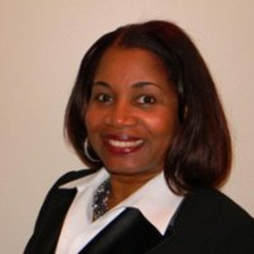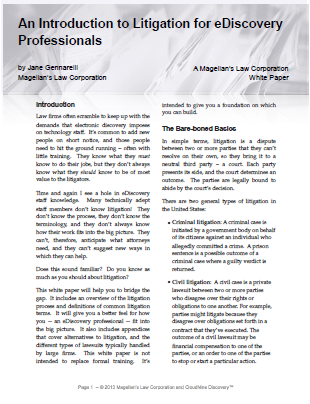eDiscovery Professional Profile: Do you know Cheryl Garner?

Cheryl Garner is the Practice Support Manager at Manning & Kass, Ellrod, Ramirez, Trester LLP – a 150 attorney law firm with six offices in the U.S. Cheryl is located in the firm’s main office in Los Angeles, but has firm-wide responsibility. She joined the firm in December 2012, after a long and diverse career in the legal field.
As Practice Support Manager, Cheryl is responsible for litigation support, paralegal staff, the Docket Department, and the Workers Compensation Hearing Representatives. She spends most of her time coordinating the work of those departments, reaching out to attorneys to ensure they have the support they need, marketing the services of the departments for which she is responsible, and educating attorneys regarding best practices and making optimal use of the technology available to them. She describes herself as a ‘Jack of all trades’ and often steps in with rolled-up sleeves to complete tasks alongside team members. She also directly handles firm-wide litigation support and eDiscovery, working closely with service providers that process data and provide hosting platforms for large cases.
Cheryl’s first legal position was with the US Attorneys office in Chicago. She was a member of a word processing pool for the civil and criminal teams. From there she went to work for the American Bar Association as a word processing operator, and later worked in law firms as a legal secretary and word processing operator. As technology advanced, Cheryl recognized that opportunities in word processing would diminish, and she developed a plan for her future. While working full-time, she completed her undergraduate studies in 2000 and in 2002 she completed an ABA-approved paralegal program. Armed with a background that included hands-on government and law firm experience, as well as paralegal and technology experience, career opportunities broadened. Up until 2008 she worked for large law firms providing secretarial, paralegal, technology, and trial support. In 2008 when she moved to a smaller firm, she soon recognized it was the perfect fit for her at that stage of her career. She believes that the experience she got at the smaller firms after working primarily in larger firms has been invaluable.
In 2012, Cheryl joined Manning & Kass as Practice Support Manager, a recently created position. The position was still in its infancy when Cheryl came on board, and she saw this as a logical progression in her career. Cheryl enjoys her work because it incorporates – and requires – the skills she has honed and the interaction she enjoys. The firm’s structure, having paralegals report to Practice Support, increases opportunities to introduce litigation technology to the litigation teams. It’s a model that works well for Cheryl.
When asked about her greatest professional accomplishment, Cheryl quickly answered “Getting to where I am now in my career”. Through hard work, foresight of the use of law firm technology, and education, Cheryl planned and crafted a career that she is proud of, one that she is good at, and one that she thoroughly enjoys.
Throughout her career, Cheryl has been active in professional organizations. While still a paralegal student, Cheryl joined the Los Angeles Paralegal Association (LAPA). Later, she sat on LAPA’s Board of Directors and was Chair of the Litigation Committee. She is still a member today. She is also a member of NALA (National Association of Legal Assistants), and recently earned the Advanced Certified Paralegal (ACP) designation in discovery. She is a member of ACEDS (Association of Certified E-Discovery Specialists) and plans to sit for the CEDS certification exam in the near future.
Cheryl is also an instructor in the technology track of the ABA-approved paralegal program at California State University Los Angeles (CSULA). Since 2011 she has taught the introductory course Law Office Technology, and more recently, Trial Technology. She will teach Applied Technology in the Fall of 2014. Cheryl enjoys teaching because it offers her an opportunity to equip paralegals entering the field with the legal technology foundation they will need to succeed as legal professionals.
Cheryl is originally from Chicago, Illinois and started her professional career there. She moved to Los Angeles 22 years ago with her son, who today also works in the legal industry. While her work at Manning & Kass and teaching at CSULA take up most of her time, Cheryl finds time to enjoy ‘Chicago Style Stepping’, an urban dance that originated in Chicago and is similar in movements to’ West Coast Swing’ and Lindy Hop. Cheryl travels to different cities to attend dancing events. There’s a lot of camaraderie among attendees from different cities, but the dance has recently re-emerged in popularity as a competitive dance, providing attendees an opportunity to showcase stylings from their region of the country. Although Cheryl hasn’t competed yet, she keeps the possibility open for the future. Jazz and other styles of music are important to Cheryl and she often attends local jazz concerts and art events around Los Angles. She’s currently looking forward to a cruise she’s planning with her sister, to an island ‘to be determined’.
Please let us know if there are eDiscovery topics you’d like to see us cover in eDiscoveryDaily.
Disclaimer: The views represented herein are exclusively the views of the author, and do not necessarily represent the views held by CloudNine Discovery. eDiscoveryDaily is made available by CloudNine Discovery solely for educational purposes to provide general information about general eDiscovery principles and not to provide specific legal advice applicable to any particular circumstance. eDiscoveryDaily should not be used as a substitute for competent legal advice from a lawyer you have retained and who has agreed to represent you.








